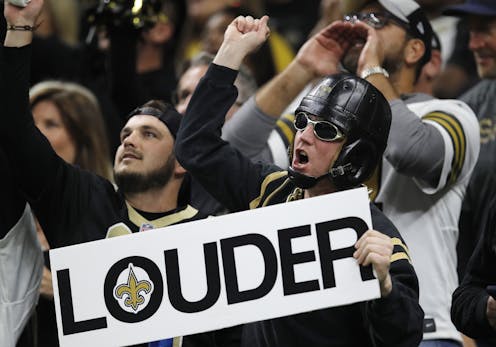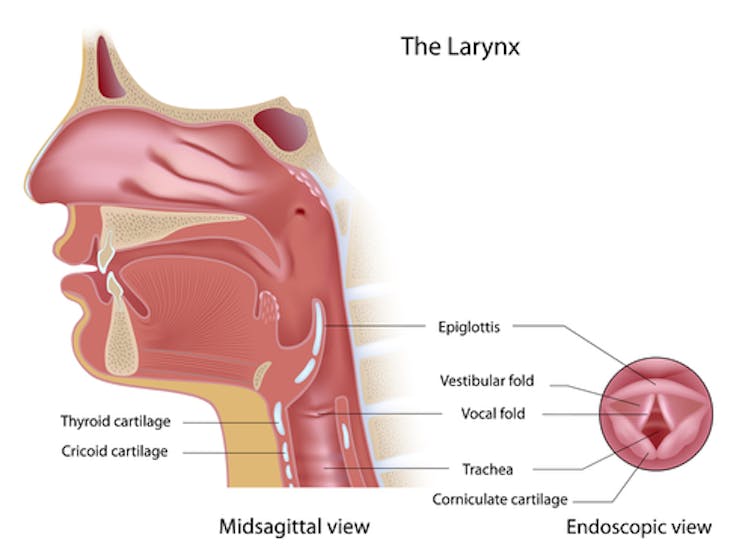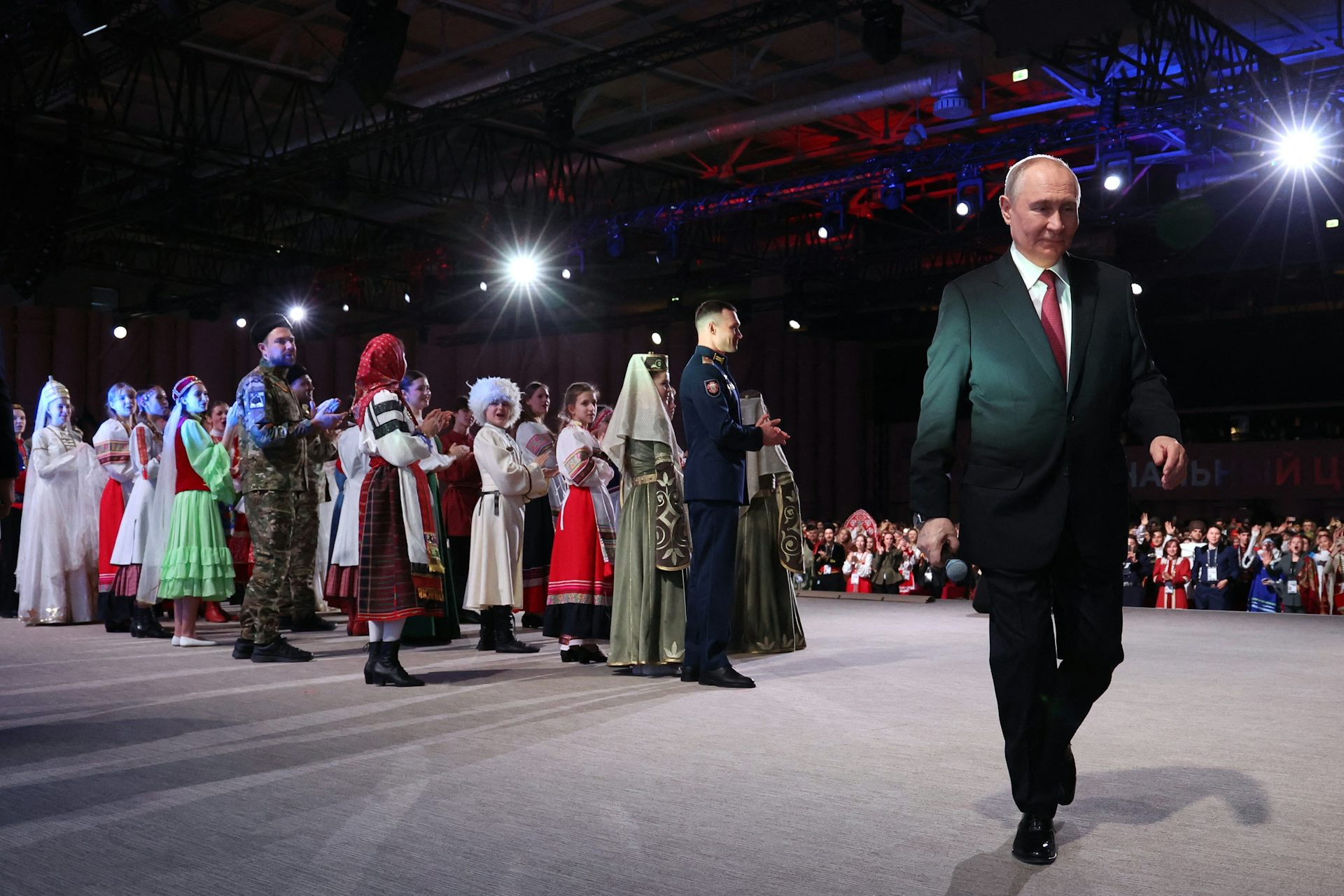How to avoid a Super Bowl injury to your voice
In the excitement of the Super Bowl and other major sporting events, fans often forget themselves – and their voices. Loud cheering can stress your vocal folds, or voice cords. An expert explains.

Passionate football fans are an integral part of the Super Bowl experience. But the intensity of energy at the game or at local bars and restaurants can also be damaging to the voice.
Certain food and beverages that we consume on game day can also result in gastric irritation and lead to symptoms, such as dry cough, sore throat, difficulty swallowing, and the sensation of a lump in your throat.
As a speech-language pathologist and voice scientist at the University of Pittsburgh School of Health and Rehabilitation Sciences, I have worked clinically with patients who have lost their voices and suffered vocal injuries from vocal overuse and harmful vocal behaviors.
During major sporting events such as the Super Bowl, fans are often so wrapped up and excited to have an amazing game day experience, that they often neglect the importance of maintaining vocal health and wellness and the consequences that can result from a weekend of excessive vocal use and overindulgence.
The power of communication
The power of communication through speech, language and song is often not fully appreciated until the ability to communicate is lost. Voice, speech and language problems can have a significant impact on activities of daily living and quality of life and lead to significant physical, psychological and psychosocial stress. These can include feelings of frustration from decreased work productivity, missed work to attend doctor’s visits, and the inability to communicate effectively with loved ones. Voice disorders can also have a significant impact on children and teens, leading to fewer social interactions with peers and concern over how they are perceived by others due to changes in their voice quality.
According to the National Institute on Deafness and Other Communication Disorders (NIDCD), an estimated 17.9 million U.S. adults ages 18 or older, or 7.6 percent, reported having had a problem with their voice in the past 12 months. Nearly 9.4 million, or 4 percent, of adults reported having a problem using their voice that lasted one week or longer during the past 12 months. These statistics are troubling considering that many disorders related to the human voice can be prevented using simple strategies for maintaining vocal health and wellness.
Avoiding the injured reserve
Every cheer from a Super Bowl viewer conveys an important message – a victorious shout, a prolonged chant or a colorful taunt. These emotions can energize the players on the field and fans in attendance, and make a difference during the final minutes of a hard-fought game.
However, a person’s vocal folds, sometimes referred to as “vocal cords,” are made up of layers of muscle, connective tissue proteins such as collagen and elastin, and a thin layer of epithelium (mucosa). These delicate tissues are susceptible to abnormal wear and tear. Repeated cycles of vocal injury and repair can make the voice hoarse and symptoms are intensified at events such as the Super Bowl, where loud crowd volumes, extreme weather conditions and frequent shouting take a toll on the vocal folds.

Fortunately, the vocal folds are capable of recovery from normal wear and tear, but Rams and Patriots fans alike can take several precautions to ensure adequate vocal health and wellness on game day and beyond:
- Use adequate breath support when projecting your voice.
- Avoid excessive and prolonged use of the voice.
- Allow adequate time for the voice to recover following a period of heavy vocal use.
- Minimize vocally traumatic activities, such as excessive yelling and speaking over crowd noise.
- Avoid overindulging in foods and beverages that cause indigestion and can cause gastric irritation, such as alcohol, caffeine, spicy and greasy foods.
- Stay hydrated.
- Avoid environmental smoke exposure.
In the event of vocal trauma during or after the big game, fans should consult their doctor for hoarseness. According to the American Academy of Otolaryngology-Head and Neck Surgery, hoarseness that lasts longer than four weeks or that has no obvious cause, especially in smokers, should be evaluated by an ear, nose and throat doctor, as this could be a sign of a more serious condition. Once an appropriate diagnosis has been made, I recommend seeking the services of a qualified speech-language pathologist, certified by the American Speech-Language-Hearing Association for specialized voice therapy and approaches to minimize and prevent further vocal injury.
Budget for better outcomes
As fans from all over the world prepare to cheer on their chosen team, I advise them to manage their voices like a coach manages timeouts. No team wants to enter the final minutes of the game without the ability to pause and regroup, so they must make their timeouts last throughout the entire second half.
Vocal conservation measures can be viewed in the same way. Whether fans are expressing joy for a win or disdain in a loss, pacing the voice and setting limits on the use of vocal extremes will result in improved vocal health and allow for adequate recovery once the weekend’s festivities are over.
Bernard Rousseau receives funding from the National Institutes of Health, National Institute on Deafness and Other Communication Disorders.
Read These Next
As war in Ukraine enters a 5th year, will the ‘Putin consensus’ among Russians hold?
Polling in Russia suggests strong support for President Vladimir Putin. Yet below the surface, popular…
After a 32-hour shift in Pittsburgh, I realized EMTs should be napping on the job
A paramedic and university professor shares data about how strategic napping could help his own health…
Menstrual pads and tampons can contain toxic substances – here’s what to know about this emerging he
Heavy metals, phthalates and other potentially harmful chemicals have been detected in a range of menstrual…






